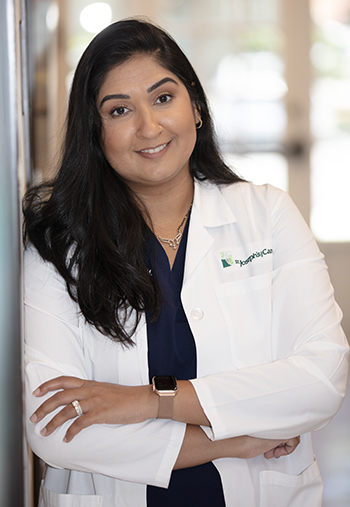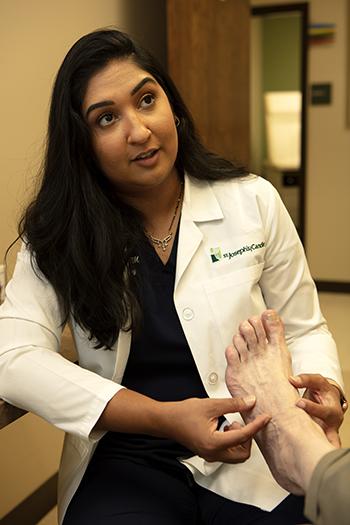Dr. Prianka Sharma specializes in surgeries involving the foot and ankle
Prianka Sharma, DPM
St. Joseph’s/Candler Physician Network - Podiatry
Specialty: Podiatry
Education:
Medical degree: Dr. William M. Scholl College of Podiatric Medicine in North Chicago, Ill.
Residency: Our Lady of Lourdes Memorial Hospital in Binghamton, NY

Office locations:
In Savannah:
310 Eisenhower Drive, Building 7A
Savannah, Ga. 31406
In Pooler:
101 St. Joseph’s/Candler Drive
Pooler, Ga. 31322
In Richmond Hill:
3866 Belfast Keller Road, Building 1
Richmond Hill, Ga. 31324
In Bluffton:
10 Oak Forest Road
Bluffton, SC 29910
912-355-6503
SJ/C: Why did you become a doctor?
My dad always wanted me to be an engineer like him. I think he recognized early on I had really good hand skills and motor skills, and I was able to put things together really quickly. He always told my mom, ‘Either she’s going to be an engineer or she’s going to be a surgeon.’ I went into school thinking I was going to be an engineer. I wasn’t the biggest fan of some of the physics-related classes so I took a turn and went into bio-chemistry. I graduated with a chemistry degree and that gave me the option to go into medical school. I graduated college really young, I was 20, so I took a year to figure out what I wanted to do. Then I took the MCAT and here we are.
SJ/C: How did you choose podiatry as your specialty?
I knew I wanted to be a surgeon. When I was in that gap year, I shadowed my former podiatrist. I was a runner in high school so I had a lot of ankle injuries. I went to shadow her and learned the work-life balance is excellent, residency is three years. Being a woman in the field, I wanted to have a family, so she was a really good inspiration for that. I shadowed her, and she sold me on it. And no regrets.
SJ/C: What are some conditions you treat? What are some surgeries you do?
We do a lot of elective surgeries but we also do a lot of non-elective surgeries. There are a few podiatry emergencies. We treat diabetic foot infections. We treat bone infections. We treat any abscesses and gangrene. We treat open fractures. Those are usually the call-in-the-middle-of-night cases. Then we have our elective cases which is really what we mostly do. We have bunions. We have hammertoes. We do all types of fracture repairs. We do plantar fasciitis procedures and take out skin lesions. There’s a lot of different surgeries we do. It’s dependent state-by-state what podiatrists are allowed to do, but here in Georgia, we have great laws that allow us to perform forefoot, rear foot and ankle surgeries. I do almost all my surgeries in Pooler at the outpatient surgery center there. The whole team is excellent. All my patients love it. All our surgeries are under two hours.
SJ/C: Why is it so important to care for your feet?

You only get one pair. Unfortunately we take our feet for granted. We are very hard on them, especially when a lot of us are working full time and we’re on our feet all day, especially in the medical field. Also, with our climate, people want to wear sandals because it’s hot but sandals don’t do us any justice as far as support and preventing issues from arising. But, a lot of the stuff that happens to our feet is hereditary. It’s not anything you are causing. Bunions, for example. Hammertoes, for example. Different types of deformities. They are hereditary. Although wearing a pair of pointy heels for 20 years isn’t helping your case, usually it is hereditary. Feet, we just take them for granted.
SJ/C: So what pieces of advice do you commonly share with your patients to care for their feet and ankles?
My rule of thumb is if you are on your feet for more than 20 minutes, you should not be wearing sandals. You should be wearing tennis shoes. If you are running errands, if you know you are going to be standing for more than 20 minutes, you should be wearing something supportive. Flipflops and sandals are great at the beach, great at the pool. If you go grab the mail, that’s fine, but you are not really doing yourself any service by doing it long term.
The other thing is that with the climate the way it is, wearing socks all the time, even in the house, you are more likely to develop athlete’s foot. A lot of people like to leave socks on 24/7. I always recommend take your socks off as soon as you get home and let the air get to your feet, especially since it’s so hot here, so you don’t give yourself an infection. If you have foot sweating problem or odor problem, always clean your shoes out with Lysol or Clorox wipes, let it dry overnight and use foot powder.
SJ/C: Do you have a moment when you thought, ‘This is why I became a podiatrist?’
All the time. The number of times that patients have said, ‘Thank you. I can walk without pain.’ Our feet are so attached to our livelihood. If you can’t stand or walk, you can’t work. I’ve given so many patients the opportunity to get back to work or work without pain. On the flip side, with the non-elective surgeries, my goal is always limb salvage; try to save the foot as much as we can. They are always so grateful for saving the foot versus amputating it. Those are the big moments. When people just say ‘Thank you.’ Even non-surgically, when people have plantar fasciitis, and it hurts every day. You give them a couple tips and tricks, and then they are able to walk without pain. It’s those times when you make the right call, intervene and the patients’ lives change.
Family: Husband, Robin
Hobbies/Interests: Following professional sports, going to the beach, trying new restaurants and hanging out with friends